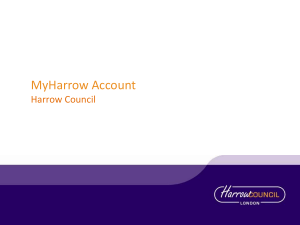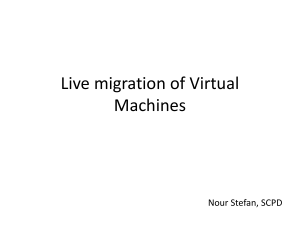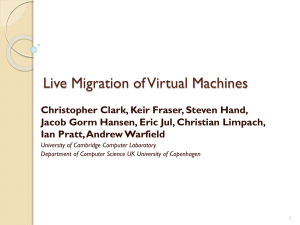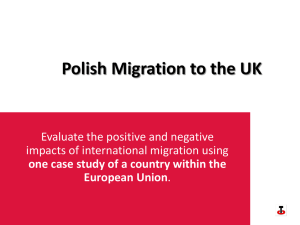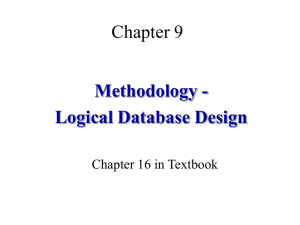Making a Seamless Move to Windows 7
advertisement
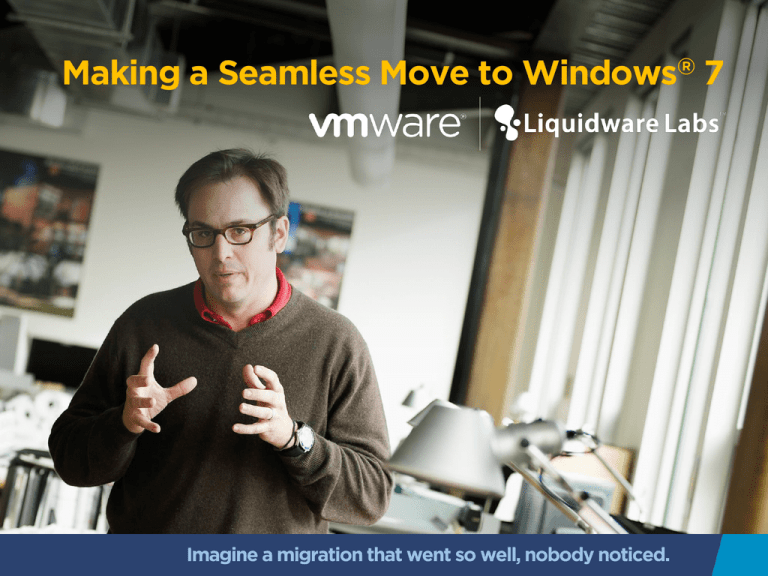
Making a Seamless Move to Windows® 7 1 Imagine a migration that went so well, nobody noticed. Process/Timeline 2 PHASE I PHASE II PHASE III Benchmark • Gather user data • Define success • Create project plan Image Deployment • Create one Master Image • Deploy remotely • Restore with personalizations Validate and Measure Success • ID and fix performance issues • Disaster recovery and repair, as needed • Quantify success PHASE I Stratusphere ™ FIT Gather user data Define success Create project plan 3 PHASE I PHASE II Horizon Mirage ™ Create one Master Image Deploy remotely Restore with personalizations 4 PHASE I PHASE II PHASE III Stratusphere ™ UX ID and fix performance issues Disaster recovery and repair, as needed Quantify success 5 Process / Timeline 6 PHASE I PHASE II PHASE III Benchmark • Gather user data • Define success • Create project plan Image Deployment • Create one Master Image • Deploy remotely • Restore with personalizations Validate and Measure Success • ID and fix performance issues • Disaster recovery and repair, as needed • Quantify success PHASE I Benchmark with Stratusphere™ FIT Assess and quantify machine, user, and infrastructure metrics. Provide visibility into user persona and authored data. Access applications for usage and master image strategy. Define the baseline user experience. Design base image on actual usage metrics. Group users into appropriate tiers based on consumption. 7 PHASE I Visibility Throughout Is Key Workers’ Desktops How are users spending their time? What are they consuming? What is the baseline user experience? 8 Target Image Are image resources adequate and available? Are problems developing? Constraints and/or avoidable crashes ahead? PHASE I Summary of Benefits Collect data automatically. Accurate data — no lost work time for users. Reduce migration labor costs. Accurate metrics lead to accurate planning. Save on licensing costs. Identify apps that users have but never use. 9 Process / Timeline 10 PHASE I PHASE II PHASE III Benchmark • Gather user data • Define success • Create project plan Image Deployment • Create one Master Image • Deploy remotely • Restore with personalizations Validate and Measure Success • ID and fix performance issues • Disaster recovery and repair, as needed • Quantify success PHASE I PHASE II Migrate Image Centrally and In-Place Centralized Images Local Copies Windows® 7 Image Mirage™ Server Network-Optimized Synchronization and Streaming 11 Desktops/Laptops with Mirage Client PHASE I PHASE II Base Image is captured from the Reference CVD. Windows 7 Reference Machine Reference CVD Base Image The BI is downloaded to one or more Branch Reflectors. CVD1 Branch Reflector CVD2 Horizon Mirage™ Server CVD3 Endpoints leverage Reflector to load new Base Image. 12 PHASE I PHASE II Summary of Benefits Better manage and optimize image creation. Manage one Master Image vs. 300. Achieve more migrations per day. Centralized migration operations eliminate most or all PC visits. Avoid loss of user files. Quickly revert to original Windows XP, preserving user personalizations and data. 13 Process / Timeline 14 PHASE I PHASE II PHASE III Benchmark • Gather user data • Define success • Create project plan Image Deployment • Create one Master Image • Deploy remotely • Restore with personalizations Validate and Measure Success • ID and fix performance issues • Disaster recovery and repair, as needed • Quantify success PHASE I PHASE II PHASE III Validate with Stratusphere™ UX Ongoing and proactive monitoring—the ability to quantify UX. Validate image changes to ensure optimal performance. Identify rogue entities and/or bottlenecks to quickly remediate issues. Enable "what-if" scenarios to plan for growth and changes. Get support for mixed VMware Mirage and VMware View environments with single pane-of-glass monitoring. 15 PHASE I PHASE II Measure for Success Reporting to ensure equal-to-better user experience At-a-glance comparison of physical machines to Mirage-managed machines Easy to see results to quickly determine if users are reaping the benefits of the transformation 16 PHASE III PHASE I PHASE II PHASE III Summary of Benefits Prevent unplanned downtime. Get fewer post-migration calls to the Help Desk. Track system performance. See from the desktop to the data center, and across all networks. Measure success. Built-in reports provide accurate ROI and TCO data. 17 What a migration looks like when you simplify the process: Save money. Reduce migration labor costs; save on licensing costs. Save time. Reduce user downtime during migration; manage one image instead of 300. Use fewer resources. Centralize migration operations; manage fewer post-migration calls. Monitor proactively. Alert administrators to issues; prevent unplanned downtime. Keep end-users productive. Optimize performance; provision resources quickly. 18 Simplify the migration process — and execute it with speed and confidence. Migration Timeline T-3 T-2 T-1 T-0 Post-Migration Monitor and measure all hardware, operating systems, and applications. Define baseline of usage and user experience. Create a master image. Conduct phased image deployment. Monitor and compare. Easily discover all the metrics you need before the move. Define what migration success will mean to you. Produce reports and use them to put a project plan together. Create and deploy a mirror-perfect image (and manage one image instead of 300). Set triggers to let you know when post-migration performance is less than ideal — and drill down to see where the problem really is. Fix it before anyone reports it as an issue. Validate that migration worked properly. Generate reports that quantify success. Disaster recovery. Use pre-migration snapshot for recovery and repair, as needed. Recover systems due to lost, stolen, or broken PCs. 19 Imagine this: You controlled your migration instead of it controlling you. You migrated on time and on budget — with minimal downtime and optimum performance during and after the migration. 20
